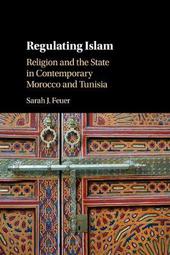
|
Regulating Islam: Religion and the State in Contemporary Morocco and Tunisia
Paperback / softback
Main Details
| Title |
Regulating Islam: Religion and the State in Contemporary Morocco and Tunisia
|
| Authors and Contributors |
By (author) Sarah J. Feuer
|
| Physical Properties |
| Format:Paperback / softback | | Pages:243 | | Dimensions(mm): Height 150,Width 230 |
|
| Category/Genre | Islam |
|---|
| ISBN/Barcode |
9781108413213
|
| Classifications | Dewey:322.109611 |
|---|
| Audience | | Professional & Vocational | |
|---|
| Illustrations |
Worked examples or Exercises; 4 Tables, black and white; 7 Line drawings, black and white
|
|
Publishing Details |
| Publisher |
Cambridge University Press
|
| Imprint |
Cambridge University Press
|
| Publication Date |
18 June 2020 |
| Publication Country |
United Kingdom
|
Description
Many countries in the Arab world have incorporated Islam into their state- and nation-building projects, naming it the 'religion of the state'. Regulating Islam offers an empirically rich account of how and why two contemporary Arab states, Morocco and Tunisia, have sought to regulate religious institutions and discourse. Drawing on a range of previously unexamined sources, Sarah J. Feuer traces and analyzes the efforts of Moroccan and Tunisian policymakers to regulate Islamic education as part of the respective regimes' broader survival strategies since their independence from French rule in 1956. Out of the comparative case study emerges a compelling theory to account for the complexities of religion-state dynamics across the Arab world today, highlighting the combined effect of ideological, political, and institutional factors on religious regulation in North Africa and the Middle East. The book makes an important and timely contribution to the on-going scholarly and policy debates concerning religion, politics, and authoritarian governance in the post-uprisings Arab landscape.
Author Biography
Sarah J. Feuer, an expert on politics and religion in North Africa, is a Soref fellow at The Washington Institute for Near East Policy. She completed her Ph.D. in politics at Brandeis University's Crown Center for Middle East Studies, and previously earned her M.A. in Middle Eastern history from Tel Aviv University, Israel, and a B.A. in history and French literature from the University of Pennsylvania. She has extensive experience in the Middle East and North Africa, including stints living in Israel, Jordan, Morocco, and Tunisia. Dr Feuer is a Term Member of the Council on Foreign Relations, and has published in Foreign Affairs and Politico, among other outlets.
Reviews'The apposite institutionalization of religion poses a political quandary for many states in the Arab world. Regulating Islam deftly explores a cocktail of three factors: ideology, political opponent profile, and institutional endowment that interact to shape the state's stance on religion. Tracing the evolution in state policy on religious education in Morocco and Tunisia over the past 60 years, Feuer accounts for the variation found in these policies across time and case, explains paradoxical outcomes (e.g. traditionally-minded states that choose to reduce state support for religion) and introduces new concepts such as 'identity bargaining' where political leaders, faced with daunting political and resource constraints, 'split the difference' between linguistic and religious dimensions of identity, and ultimately privilege an emphasis on Islam in the state educational system. An enlightening contribution to the politics of religion in the Arab world and beyond.' Eva Bellin, Myra and Robert Kraft Professor of Arab Politics, Crown Center for Middle East Studies, Brandeis University, Massachusetts 'Sarah J. Feuer combines theoretical sophistication with extensive fieldwork in Morocco and Tunisia to bring new insight into how governments regulate religion in general and religious education in particular. First she demonstrates that existing theories, while providing insight, fail to fully explain Tunisia and Morocco. She then weaves an intricate yet accessible and understandable theory based on the interaction between a government's ideology, its institutional strength, and the nature of its opposition to explain how governments formulate religion policy. This thoughtful and insightful book will influence how we think about religion policy well beyond Morocco and Tunisia.' Jonathan Fox, Yehuda Avner Professor of Religion and Politics, Bar Ilan University, Israel
|